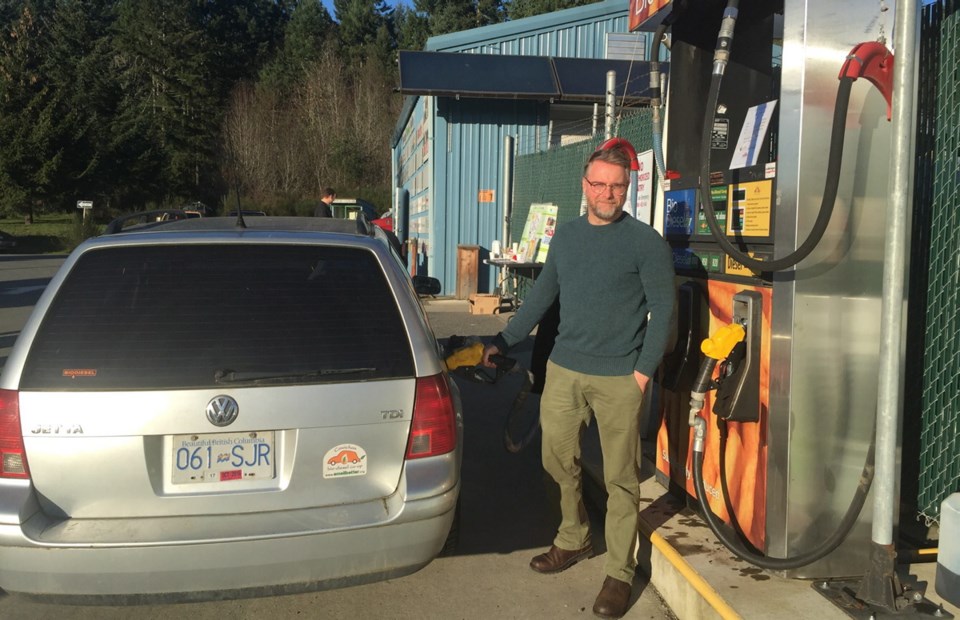A group of Mexican researchers is looking to an unlikely source for tips to reduce Mexico City’s air pollution: the Cowichan Valley.
Five researchers from the Ibero-American University are spending the month of May in Duncan studying the Cowichan Bio-Diesel Co-op, in partnership with Vancouver Island University. The group is interested in understanding what motivates someone to buy an alternative fuel, what makes them keep using it and why some might stop.
“This is a good opportunity for Mexico to know more about what you are doing on Vancouver Island,” said Odette Lobato, an engineering professor at Ibero-American University who is leading the study.
“[Mexico City] is a very polluted city and if we can produce bio-diesel and consume that in the city, we can reduce the pollution without buying new cars.”
Lobato said she is developing a consumer-satisfaction index that goes beyond price to social, environmental and cultural factors.
She has done similar studies on a fair-trade coffee co-op in southern Mexico, she said.
The Cowichan Bio-Diesel Co-op launched in 2005, selling locally made, non-toxic bio-diesel in jugs at farmers’ markets.
Today, it collects leftover cooking oil from 250 restaurants and pubs across Vancouver Island, from Tofino to Campbell River, and recycles it into fuel that can power motor vehicles.
The non-profit has two functioning pumps where users can fill up on various grades of bio-diesel.
Its more than 50 active members range from individuals to the Cowichan Valley Regional District, which uses the fuel for its waste-management fleet of vehicles.
“Bio-diesel can blend perfectly with regular petroleum, so you could have half a tank of regular diesel and fill the other half with vegetable-oil diesel, if you choose,” said Brian Roberts, president of the co-op and executive director of Cowichan Energy Alternatives.
Fuel at the pumps ranges from B100 fuel, which is 100 per cent bio-diesel, to B20, which is a 20 per cent bio-diesel blend with regular fuel.
Consumers can expect to pay about five cents per litre more than for regular diesel for the B20, and 20 to 25 cents per litre more for the B100.
The co-op has a promotion on, offering the B100 for $1.30 per litre.
Roberts said there are parallels between the alternative-energy market and other markets that offer products that might be more expensive, but include some kind of ethical incentive.
“In some ways, what we’re doing is very much like the organic food market,” Roberts said.
“But we’re probably 10 years behind, because they’ve been working on this and getting stores and the public to understand that not all food is the same. Where it is produced, how it is produced, has an impact on the food.”
Compared with petroleum-based diesel, the bio-diesel from the co-op is non-toxic and locally produced and reduces a consumer’s carbon footprint, he said.
“For every litre you use [instead of regular diesel], you’re keeping three kilograms of carbon-equivalent greenhouse gases from entering the atmosphere,” said Roberts, adding he’s looking forward to hearing the results of the research.
“It will help us communicate about what’s important to people.”
So far, Lobato said members of the co-op have said they use bio-diesel because they believe it’s healthy, local, sustainable and good for the environment.
One limitation she heard from consumers is that the co-op has only two pumps.
And while some users were initially concerned the bio-diesel might damage their engines, she said none reported damage to her.
Another bio-diesel co-op, the Island Biodiesel Co-operative, is based in Victoria. In 2016, the co-op sold more than 10,000 litres of biodiesel, its website says.
It has four “stations”: Two in the Victoria area, one in Sidney and one on a Gulf island. The location, hours and logistics of accessing the fuel are shared only with members.



